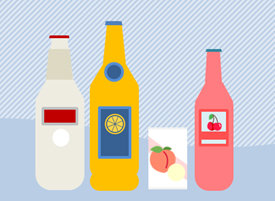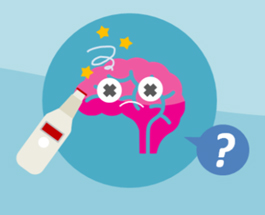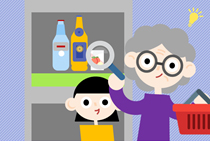Alcopop, Caffaine and Alcohol
 To make popular among young people, more and more alcoholic beverages in the market, known as the “alcopop”, are purposely made resembling to soft drinks in packaging and taste. However, these new alcoholic beverages may pose a direct threat to the health of whom consume them. In other words, “alcopops” are no safer than other alcoholic drinks.
To make popular among young people, more and more alcoholic beverages in the market, known as the “alcopop”, are purposely made resembling to soft drinks in packaging and taste. However, these new alcoholic beverages may pose a direct threat to the health of whom consume them. In other words, “alcopops” are no safer than other alcoholic drinks.
What are "Alcopops"?
- "Alcopops" are sweet-tasting, pre-mixed alcohol-based drinks which contain juice, other flavours or even caffeine.
- Sold in single colourful serving bottles or cans that resemble soft drinks, they usually contain similar amounts of alcohol as beer (about 4-7%) but can contain up to 8-12% of alcohol content
- Not only does the outlook make the drink look less threatening, but its fruity flavor also masks the alcoholic taste, leading to a greater consumption. As a result, the tendency to binge drink can put one’s health into jeopardy.
What are caffeinated alcoholic beverages?
- Caffeinated alcoholic neverages (CABs) are attracting much attention after being introduced into the market are premixed beverages that combine alcohol, caffeine, and other stimulants or energy drinks.
- CABs may be malt-spirits-based or distilled-spirits-based. They contain 5-12% alcohol (can up to 3 times alcohol content in beer from the market).
What are the dangers of drinking caffeine-laden alcohol or mixing alcohol with energy drinks?

- While the alcohol in CABs tends to make drinkers sleepy, the added caffeine can make people less alert on how drunk they are.
- Individuals drinking these beverages may consume more alcohol and become more intoxicated before they can realise.
- The Food and Drug Administration (FDA) in the United States has raised serious concerns over alcoholic beverages with added caffeine.
- In addition, energy drinks that contain ingredients such as caffeine, taurine, glucuronolactone and B vitamins, etc. should not be consumed along with alcohol or drugs.
- Overseas studies have shown that, compared with drinkers without mixing alcohol with energy drinks, drinkers consuming alcohol mixed with energy drinks were 3 times more likely to binge drink.
- Binge drinking can increase risk of a series of immediate and long term harm including alcoholic poisoning, accidental injury, interpersonal violence, road traffic accidents, unsafe sex, alcohol abuse and alcohol dependence.
Pay attention

- When purchasing beverages for children and adolescents, pay attention to the food label. Do not judge the beverage by its packaging alone so as to avoid buying those containing alcohol
- If drinking at all, avoid drinking caffeine-laden alcoholic beverages, and do not consume alcohol mixed with energy drinks
- Alcohol causes cancer and should not be used for improving health.
- If you don’t drink, do not start drinking.
- If you choose to drink, limit your drinking after knowing the risk to minimise alcohol harm.
- Please note there is no safety level for drinking.
- For your health and lowering risk of cancers, you can reduce your drinking step by step. Staying sober is the best option.
- Children, adolescents and pregnant women should not drink.
You may also wish to know: